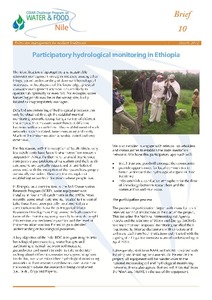Bringing farmers' options to farmers' fields in the East Africa Highlands
In this video interview, Tilahun Amede of ILRI and IWMI introduces a new book 'Integrated natural resource management in the highlands of East Africa.' The book captures learning by farmers and researchers on NRM research - how to do it; what institutional mechanisms and arrangements are needed for NRM to work for farmers. He emphasizes that NRM, including watershed management goes beyond hydrological boundaries - the social boundaries and networks around specific landscapes are the important ones.




